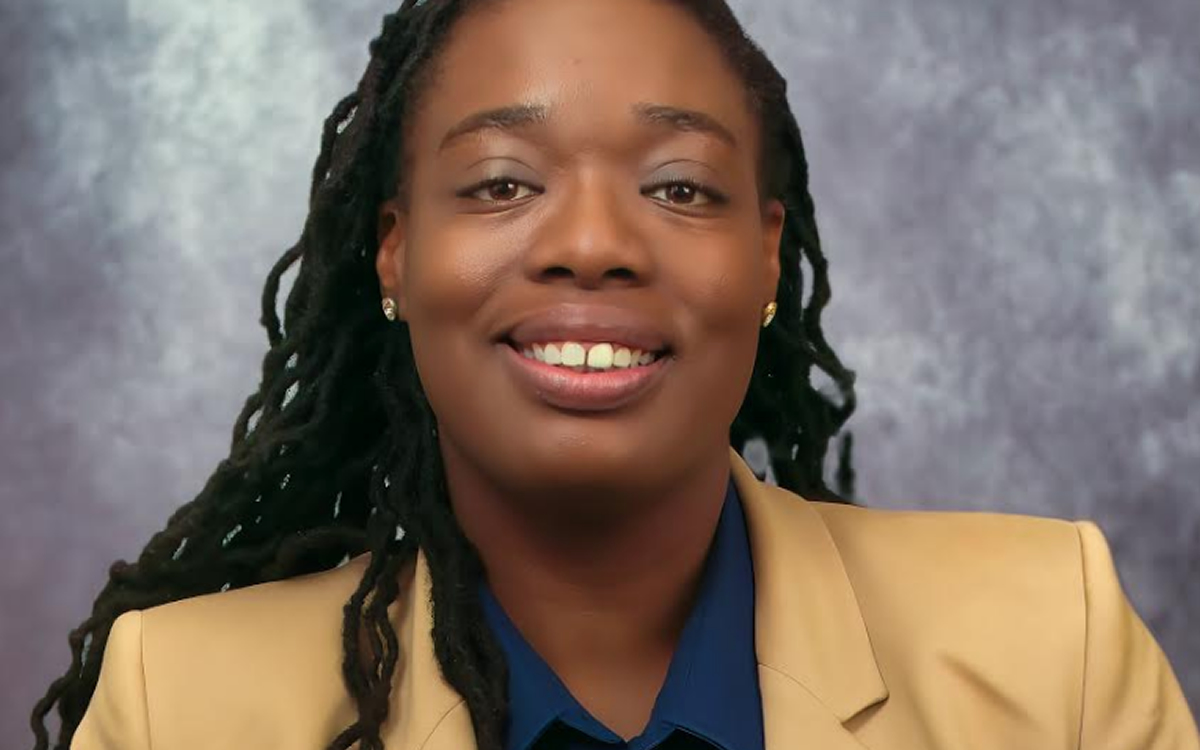Politics
Odessa Kelly looks to make history in Tennessee House race
Would be first out Black woman to serve in Congress

Odessa Kelly is the archetype of a grassroots community advocate turned politician. Her long, wavy locs frame the kind of smile that will lend you a cup of sugar or invite you to an impromptu backyard barbecue just because. Kelly speaks like someone who has been in the trenches, can relate to all our struggles, and is authentically rooting for our successes.
A native of Nashville, Kelly grew up on the east side of the city in a poor working class neighborhood riddled by poverty and gun violence. An active and creative child, Kelly played Amateur Athletic Union (AAU) basketball and used her Barbie dolls as hostages in her imaginative G.I. Joe schemes.
“Even though I’m from the hood and we weren’t rich by any means, I had a very blessed childhood,” Kelly said. “I grew up in a house with both of my parents and had a very solid foundation.”
After graduating from Stratford High School (now Stratford STEM Magnet School), Kelly attended Tennessee State University, where she earned a bachelor’s degree in business administration, and later, Cumberland University, where she earned a master’s degree in public service.
Kelly is running against a Trump ally, incumbent Rep. Mark Green (R), for Tennessee’s redrawn seventh congressional district, a formerly Democratic-majority district ruptured by Republican-led gerrymandering that echoes the South’s history of political turmoil.
If elected, Kelly would make history on multiple fronts — she would be the first out Black woman elected to represent Tennessee, the first out Black lesbian to serve in the U.S. House and the sixth openly gay woman to serve in Congress. (Former Rep. Barbara Jordan was revealed to be in a same-sex domestic partnership in her obituary.)
And Kelly is ready to make history along with her state next month, as long as all eligible Tennesseans get out and vote.
“2020 showed us that Tennessee is not a red state, it’s a non-voting state,” Kelly told the Blade in an interview.
Kelly credits the Justice Democrats for being unrelenting supporters of her campaign.
Surprisingly, Kelly was unaware of the history she would make as the first openly gay Black woman to be elected in Tennessee.
“It didn’t hit me until after I decided to run and I was literally reading the prospectus that was put together for me,” Kelly said.
For more than a decade, Kelly worked in the Nashville Department of Parks and Recreation as the leader of the Napier Community Center and executive director of Stand Up Nashville.
In 2018, when Kelly learned the city awarded a $275 million bond to billionaire John Ingram for the construction of Geodis Park, a stadium for the city’s new major league soccer team Nashville SC, Stand Up Nashville got to work securing a community benefits agreement (CBA) with Ingram.
The unprecedented agreement secured affordable housing, a $15.50 an hour minimum wage for all stadium workers, affordable childcare and workforce development.
“That CBA was our pride and joy,” Kelly said.
But Kelly recalls her proudest moment as the time she overheard a group of teenagers she was working with at Napier Community Center discuss how they don’t have to worry about what will happen to them after graduation because they have the community benefits agreement.
“You preach some of these things so much the kids just roll their eyes because they hear it 24/7, but at that point, I knew every bit of stress was worth it,” Kelly said.
Kelly’s love for her city and community didn’t stop with Stand Up Nashville. Now, Kelly channels that same energy and hard work into her campaign to stand up for Tennessee in Washington.
Kelly is a self-proclaimed Blue Dog Democrat whose platform includes Medicare for all and the Green New Deal, which focuses on combating climate change by moving away from fossil fuels and creating millions of high-paying jobs.
“The Green New Deal is me thinking about pathways out of poverty,” Kelly said.
Outside of the political arena, Kelly is a mother of two and a foodie who enjoys gaming, sports, and listening to music. Running for public office can be frenetic, but when Kelly needs to refocus and take a deep breath, she turns on her go-to song, Meek Mill’s “Amen.”
“I’m from the South so I like soulful rap and anything that has a good beat,” Kelly said.
When asked about her plans if she doesn’t win her election, Kelly said she is still considering all options.
“I’m gonna need a minute to make a decision about what I do next. All I want to do is try to win this race,” Kelly said. “And I hope I’m showing up well and speaking to the urgencies of the majority of you out there.”
Congress
Congress passes ‘Big, Beautiful Bill’ with massive cuts to health insurance coverage
Roughly 1.8 million LGBTQ Americans rely on Medicaid

The “Big, Beautiful Bill” heads to President Donald Trump’s desk following the vote by the Republican majority in the U.S. House of Representatives Thursday, which saw two nays from GOP members and unified opposition from the entire Democratic caucus.
To partially offset the cost of tax breaks that disproportionately favor the wealthy, the bill contains massive cuts to Medicaid and social safety net programs like food assistance for the poor while adding a projected $3.3 billion to the deficit.
Policy wise, the signature legislation of Trump’s second term rolls back clean energy tax credits passed under the Biden-Harris administration while beefing up funding for defense and border security.
Roughly 13 percent of LGBTQ adults in the U.S., about 1.8 million people, rely on Medicaid as their primary health insurer, compared to seven percent of non-LGBTQ adults, according to the UCLA School of Law’s Williams Institute think tank on sexual orientation and gender identities.
In total, the Congressional Budget Office estimates the cuts will cause more than 10 million Americans to lose their coverage under Medicaid and anywhere from three to five million to lose their care under Affordable Care Act marketplace plans.
A number of Republicans in the House and Senate opposed the bill reasoning that they might face political consequences for taking away access to healthcare for, particularly, low-income Americans who rely on Medicaid. Poorer voters flocked to Trump in last year’s presidential election, exit polls show.
A provision that would have blocked the use of federal funds to reimburse medical care for transgender youth was blocked by the Senate Parliamentarian and ultimately struck from the legislation — reportedly after the first trans member of Congress, U.S. Rep. Sarah McBride (D-Del.) and the first lesbian U.S. senator, Tammy Baldwin (D-Wis.), shored up unified opposition to the proposal among Congressional Democrats.
Congress
Ritchie Torres says he is unlikely to run for NY governor
One poll showed gay Democratic congressman nearly tied with Kathy Hochul

Gay Democratic Congressman Ritchie Torres of New York is unlikely to challenge New York Gov. Kathy Hochul (D) in the state’s next gubernatorial race, he said during an appearance Wednesday on MSNBC’s “Morning Joe.”
“I’m unlikely to run for governor,” he said. ““I feel like the assault that we’ve seen on the social safety net in the Bronx is so unprecedented. It’s so overwhelming that I’m going to keep my focus on Washington, D.C.”
Torres and Hochul were nearly tied in a poll this spring of likely Democratic voters in New York City, fueling speculation that the congressman might run. A Siena College poll, however, found Hochul leading with a wider margin.
Back in D.C., the congressman and his colleagues are unified in their opposition to President Donald Trump’s signature legislation, the “Big Beautiful Bill,” which heads back to the House after passing the Senate by one vote this week.
To pay for tax cuts that disproportionately advantage the ultra-wealthy and large corporations, the president and Congressional Republicans have proposed massive cuts to Medicaid and other social programs.
A provision in the Senate version of the bill that would have blocked the use of federal funds to reimburse medical care for transgender youth was blocked by the Senate Parliamentarian and ultimately struck from the legislation, reportedly after pressure from transgender U.S. Rep. Sarah McBride (D-Del.) and lesbian U.S. Sen. Tammy Baldwin (D-Wis.).
Torres on “Morning Joe” said, “The so-called Big Beautiful Bill represents a betrayal of the working people of America and nowhere more so than in the Bronx,” adding, “It’s going to destabilize every health care provider, every hospital.”
Congress
House Democrats oppose Bessent’s removal of SOGI from discrimination complaint forms
Congressional Equality Caucus sharply criticized move

A letter issued last week by a group of House Democrats objects to Treasury Secretary Scott Bessent’s removal of sexual orientation and gender identity as bases for sex discrimination complaints in several Equal Employment Opportunity forms.
Bessent, who is gay, is the highest ranking openly LGBTQ official in American history and the second out Cabinet member next to Pete Buttigieg, who served as transportation secretary during the Biden-Harris administration.
The signatories to the letter include a few out members of Congress, Congressional Equality Caucus chair and co-chairs Mark Takano (Calif.), Ritchie Torres (N.Y.), and Becca Balint (Vt.), along with U.S. Reps. Nikema Williams (Ga.), Hank Johnson (Ga.), Raja Krishnamoorthi (Ill.), Delia Ramirez (Ill.), Joyce Beatty (Ohio), Lloyd Doggett (Texas), Eleanor Holmes Norton (D.C.), Josh Gottheimer (N.J.), and Sylvia Garcia (D-Texas).
The letter explains the “critical role” played by the EEO given the strictures and limits on how federal employees can find recourse for unlawful workplace discrimination — namely, without the ability to file complaints directly with the Employment Opportunity Commission or otherwise engage with the agency unless the complainant “appeal[s] an agency’s decision following the agency’s investigation or request[s] a hearing before an administrative judge.”
“Your attempt to remove ‘gender identity’ and ‘sexual orientation’ as bases for sex discrimination complaints in numerous Equal Employment Opportunity (EEO) forms will create unnecessary hurdles to employees filing EEO complaints and undermine enforcement of federal employee’s nondiscrimination protections,” the members wrote in their letter.
They further explain the legal basis behind LGBTQ inclusive nondiscrimination protections for federal employees in the EEOC’s decisions in Macy v. Holder (2012) and Baldwin v. Foxx (2015) and the U.S. Supreme Court’s decision in Bostock v. Clayton County (2020).
“It appears that these changes may be an attempt by the department to dissuade employees from reporting gender identity and sexual orientation discrimination,” the lawmakers wrote. “Without forms clearly enumerating gender identity and sexual orientation as forms of sex discrimination, the average employee who experiences these forms of discrimination may see these forms and not realize that the discrimination they experienced was unlawful and something that they can report and seek recourse for.”
“A more alarming view would be that the department no longer plans to fulfill its legal obligations to investigate complaints of gender identity and sexual orientation and ensure its
employees are working in an environment free from these forms of discrimination,” they added.
-

 U.S. Supreme Court4 days ago
U.S. Supreme Court4 days agoSupreme Court to consider bans on trans athletes in school sports
-

 Out & About4 days ago
Out & About4 days agoCelebrate the Fourth of July the gay way!
-

 Virginia4 days ago
Virginia4 days agoVa. court allows conversion therapy despite law banning it
-

 Opinions5 days ago
Opinions5 days agoCan we still celebrate Fourth of July this year?










